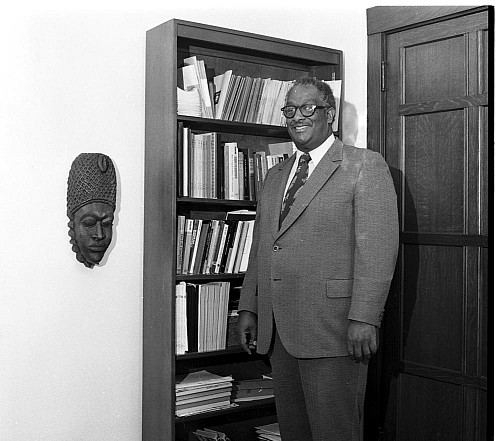‘We’re still fighting the same fight today’
By Barbara Brosher
April 04, 2022
When Indiana University Bloomington established the department of Afro-American studies in 1970, it was the first department in the Midwest and the second in the country dedicated to the discipline. More than 50 years later, faculty and students are celebrating the department’s anniversary and looking to the future.
“Our department was birthed out of struggle,” said Jakobi Williams, department chair. “We’re still fighting the same fight today that we were when we were founded 50 years ago –conversations about race, human rights and justice remain at the forefront.”

What’s now known as the department of African American and African Diaspora studies at IU Bloomington is one of the oldest and most unique in the nation. Herman C. Hudson founded and chaired the first iteration of the department in 1970, after Black students organized and demanded such a program and more representation. The impact of Hudson’s vision and the department’s work can be seen throughout the campus.
“In the early decades, the department was the impetus for the development of many collaborative units on campus that were created as an extension of our research and teaching,” said Valerie Grim, director of undergraduate studies and the Atkins Living-Learning Center. “What you see on this campus that resonates as sites and spaces where Black culture can be explored came from our faculty.”
The department played a role in the establishment of the Neal-Marshall Black Culture Center, the Archives of African American Music and Culture and the Black Film Center and Archive. It also has a direct link to the creative arts through the African American Arts Institute, which offers classes that serve as the foundation for IU Soul Revue, the African American Choral Ensemble and the African American Dance Company. The fusion of academics and performance in the area of Black studies makes IU unique.
“We are the only department of African American and African Diaspora Studies in the country that has a performance area,” said Carolyn Calloway-Thomas, professor and director of graduate studies. “No other department in the country has such a beautiful expressive reach.”

The department also stands out because of its relationship with the Atkins Living Learning Center. It offers a course that serves as the intellectual foundation of the academic life of Atkins, which is now facilitated as an academic program through African American and African Diaspora Studies. Department faculty also worked very closely with Herman Hudson, in his role as dean of Afro-American Affairs, to establish the Minority Achievers Program, now known as the Hudson & Holland Scholars Program, and the Graduate Minority Achievers Program. Both programs provide funding for high-achieving students from communities historically excluded due to race and ethnicity.
The department’s reach is also global. In 2019, it was instrumental in the creation of the Center for the Study of African American Literature and Culture at China University of Mining and Technology-Beijing. It also collaborates with departments and scholars in India, Algeria, Brazil, Ghana, Germany, Turkey, Oceania and other places, telling the impactful stories of the history and culture of African Americans using scholarly research.
The department’s growth and impact are being celebrated during its 50+1 anniversary, which features events throughout the semester. The anniversary will culminate with an all-day symposium focused on the future of Black studies. The conversations will explore a variety of topics through the lens of Agency Reduction Formation, which involves any system of thought that distracts, neutralizes or reduces the need and desire for assertive collective agency by African Americans.
Grim is co-hosting the symposium, along with Michael Tillotson, associate professor of Africana studies at SUNY Cortland. She is the longest-serving faculty member in the department and has watched it evolve over the decades. She’s proud to celebrate the past, while also embracing new directions.
“This anniversary for us means a continuation of how important agency is in the intellectual process,” Grim said. “A well-supported and very visible African American and African Diaspora studies department suggests a lot about Bloomington and Indiana university. And what it suggests is that this is a place where the experiences and culture of people are taken seriously.”